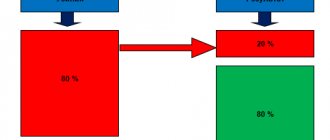When tension grabs you by the throat, and disappointments pour in like a cornucopia, you seriously begin to think that someone has put a curse on you. Day after day goes by like this, but you cannot find a solution to your problems. And then a close friend or family member appears on the horizon and will give you brilliant advice.
This friendly and optimistic person will advise you to give up on problems and go with the flow. But for some reason you still can’t relax, suspecting your friend of immature thinking. Let's talk about whether this simple advice is the best way to get rid of problems? Can the goal you set be achieved if you surrender to the mercy of the turbulent flow of events?
What does it mean to “go with the flow”?
The origin of another similar catchphrase, “come what may,” is attributed to the Roman Emperor Marcus Aurelius. Apparently, the ruler urged his subjects not to waste energy in the fight against the existing social order. The Emperor advised people to accept things as they are.
As if the current of a stormy river could carry you, washing you to the part of the shore that fate has chosen for you. At the same time, you yourself do not decide anything, but simply gratefully accept all future events. Handy advice for a ruler, isn't it? Thousands of dissenting people will never rebel against the system, but will blindly obey all the instructions of “providence.”
Carrots growing between boards: how to sow seeds to reap the harvest twice
Venus entered the constellation Aries: forecast for all signs
The son of Shepelev and Zhanna Friske received the first cup in the tennis tournament
Determine what is truly valuable and important to you
There are quite a few ways to manage yourself and your perceptions, one of these methods is ACT (Acceptance and Commitment Therapy, or acceptance and responsibility therapy). Using this technique, you can take small but effective steps to normalize the situation in which you find yourself, without postponing anything until tomorrow and without setting yourself too global - and therefore unattainable - goals.
Before you is a polygon consisting of several reference points. The top point is the “here and now” state. It means connection with the present moment, awareness of oneself and the surrounding reality. The lowest point is called “I am an observer”: this is our ability to be aware of what is happening, without worry or judgment. It is from this point that we begin to move towards real change.
Step #1:
we focus in the position of “I am an observer” and realize that our own life does not bring us satisfaction and we want to change it.
Step #2:
we accept the current state of affairs without any evaluation or condemnation. If you get the feeling that everything is bad and you can’t fix anything, realize that “bad” is a value judgment and return to a state of acceptance. Acceptance is a calm and even state of “it is so.”
Step #3:
we separate what is happening from our ideas about it - from fears and negative attitudes. We seem to “cleanse” the events of our life from the emotions accompanying them.
Step #4:
now we begin to take actions that bring us closer to our values, namely, to what we really want.
Even if you don’t have a clear understanding of what direction you want to move in, you still have values - what you like and what you want. Be guided by them.
For some, values are a quiet time with loved ones, contemplation of nature, the opportunity to engage in creativity; for others, constant communication with new people, overcoming obstacles and eternal excitement. It is important to understand what is meaningful to you. But be prepared for the fact that your values may not coincide with generally accepted goals. Perhaps you realize that you want to travel the world with a camera at the ready, and not painfully climb the career ladder. Nevertheless, having taken even the smallest step towards what is truly valuable, you will feel an influx of strength and
There is a force that can lead each of us to an unhappy life if we do not resist it in time. I call it "drift".
Path of least resistance
Drift is the result of decisions you make, following the path of least resistance. Get married because everyone else gets married, take the first job offer you get instead of finding the one you really want, or do something to please your family. This is drift. And that scares me: not because it puts you in danger. But because without making a conscious choice (even if it is often wrong), you cannot come to a happy ending. As a result, your life does not reflect your values or aspirations. Once upon a time, the course of my life “nailed” me to the Faculty of Law - not because I wanted to, but because I didn’t know what I wanted to do. It seemed to me that I had every reason to believe that I was doing the right thing: the study of law was a very suitable occupation and application of my abilities, and there was also room for maneuver. But I didn't really think about my choice. When I finally realized what was best for me, I started writing. I'm much happier now than then...
How to understand what is carrying you downstream?
Drifting may seem like laziness to some, but, according to my definition, this is not at all the case (I wasn’t lazy at all while I was studying law, on the contrary, I spent enormous effort!). Drifting is when you are guided by someone else's opinion or someone else's expectations, rather than by your own thoughts and desires. For example, you thought about your own business, but never decided to open it because your husband said it was crazy. Or you would like to start a club of similar interests, but your friends dissuaded you. Later, it may seem to you that you did the right thing (your own business is such a responsibility!), but every time you give up your values and interests, you accumulate sadness in yourself. Inner sadness leads to boredom and an inability to make decisions.
Take the mini-test Gretchen Rubin - author of a book on how to be happy
Take the mini test
To see if you are drifting, look at the statements below. If two or more of them seem true to you, it's time to take an honest look at your life and understand in which aspects of your life you have surrendered to the will of the flow.
- Sometimes I have the feeling that I am living someone else’s life and still waiting for mine to begin.
- I am busy doing the same thing as my surroundings. Or, while doing something, I often say to myself: “I can do it too!” or “What if one day this becomes interesting to me?”
- I fantasize that some natural disaster or outside intervention will change my situation, for example: because of a flood, the office will close or I will be transferred to another city.
- I spend a lot of time daydreaming about a completely different life as a way to distract myself from my current job.
- I once had various interests and hobbies, but now I have abandoned them all and try not to think about them.
How to deal with drift?
Envy can be the spark. If you look at someone else's life with more than admiration - and with a feeling closer to a passionate desire for the same thing - here is your key to action! Also take a closer look at your hobby. What do you like to do in your free time from work and household responsibilities? So, when I was still in law school, I started working on my book about happiness. I did this on weekends. And one day I admitted that it was this hobby that attracted me most. It was the draft of the book that gave me the strength to resist the flow. Think about what you might discover about yourself if you take your passions more seriously?
Choose the right course
To dust off your inner compass and find your true path, try repeating a motivating statement. One of my favorites: “You can choose a job, but not a vocation!” Doing something and loving to do something are not the same thing! Let me explain: you may be busy, for example, with office work, but you cannot force yourself to love this field of activity. Which means you don’t feel happy.
But it’s not enough to understand what you don’t want to do. It remains to be seen which way to sail next. This will take time. Use the flow while you reflect. Drift, but be sensitive to your desires and dreams. Ask yourself: “What do I want? What do I really want to do? What captivates me? Focus not on the “shoulds” (although we understand that some “shoulds” cannot be avoided), but choose from what inspires you most.
This is the only way you can get back on track. Being able to be yourself gives you a feeling of freedom. You will know when you stop drifting and start building a life based on your values and interests. And believe me, this is happiness!
How many people now say that if you want to achieve something, you need to stop going with the flow and, against fate, do everything to get your material or non-material happiness... Western psychologists and business coaches unanimously insist that you simply must take take your life into your hands and fight fate to the last drop of mental health. But turning to Eastern philosophy, we see directly opposite statements. And here the question arises: “Who is right?”
The truth is always there. Everyone should choose a method that is close to them. But before you make a choice, you need to carefully analyze this is a run from something or towards a specific goal. And the main thing is to realize that “going with the flow” is not necessarily a generally accepted inert state without aspirations.
Ways to go with or against the flow:
In the generally accepted meaning, to go with the flow is lazy, inert, lacking initiative.
The “beauty” of such a movement is obvious: a person is not to blame for anything—it’s all “evil circumstances.” Not only does he not go against fate, he generally stops going with the flow over time, although the illusion of activity remains. Without noticing the lucky chances offered by fate, without taking any action, a person simply waits for the “promised” happiness to fall on him. The river of life throws him out sooner or later, at best, into a quiet backwater, where he flounders, and at worst, into a swamp, where he remains dissatisfied with himself, fate and everyone around him.
It is too active to swim with the flow of life, actively try different currents, look into all the backwaters and flounder without respite.
Like a blind kitten poking its nose in search of a lucky break that leads to happiness. This often happens from excessive curiosity, fear of missing out on something “mega-important,” the inability to hear oneself, or the lack of intended goals. It’s a rather energy-intensive way to go with the flow towards the final goal, given that only a few achieve what they want and completely by accident.
The greatest efficiency will be with conscious movement with the flow.
It is important to understand the main thing: in order to sail somewhere you need to start moving somewhere, and the same is true for achievements in life. First you need to decide on your desires and goals. Choose the river bed to which your Soul is drawn, and not just what is fashionable. Set intermediate goals for yourself and a schedule for rowing (your actions to achieve).
Going with the flow consciously means:
with eyes wide open
- observing and studying every turn, so as not to miss yours, studying all the possibilities, but not rushing into each one thoughtlessly
avoiding the whirlpools
- letting go of emotions and not focusing on annoying little things
participating in the movement
- all the time doing something, improving, learning something useful to achieve
“Against fate” or “swimming against the tide” is the most difficult option for moving through life.
It doesn’t matter if this happens because of stubbornness, the conviction of the need to overcome obstacles, or the desire to then cry into someone’s vest about injustice - such a desire to move against fate inevitably leads to depression and nervous exhaustion.
Does moving against the grain lead to your goal? -It’s difficult to say for sure, but it’s more likely no than yes...
Going with the flow consciously is moving in the direction of your destiny, which gives peace and a harmonious state. Something unnecessary or contraindicated, received in defiance of fate, will not fit into a happy future and will rather be a burden than give happiness in the future. Or, at best, it will turn out to be wasted time and nerves.
The pointlessness of fighting windmills
In modern psychology, there are two completely different interpretations of this phraseological unit. We all understand that there is no point in fighting at windmills. And if we encounter this insurmountable barrier, it would be reasonable to retreat from our original goals. It’s not for nothing that the ancient sages said that an intelligent person will not rise to the occasion. He will stop, think and will definitely find a workaround.
Psychologists do not suggest relying entirely on the notorious current. This technique must be used selectively. For example, why grieve that nature did not endow you with tall height? Can't you find other ways to stand out from the crowd?
Keep your feelings under control
All the feelings that we experience can be divided into two groups - those that help us and those that hinder us. And if you have firmly decided to stop living by inertia, obeying only external stimuli, you need to understand your own emotions - learn to control negative feelings and consciously create positive ones. First, try to track the sources of your emotions. It's not as simple as it seems at first glance. The fact is that the most important component of “autopilot” is irrational beliefs. Such beliefs most often come from childhood - they can be borrowed from parents, teachers and educators, or be taken from other sources that participated in the formation of our personality.
Here is an example of an irrational belief: “close people should always support me.” It sounds right and natural. But in fact, close people cannot always support you - they have their own problems and difficulties (and also bad moods, which no one has canceled either). As a result, irrational beliefs become the source of a whole range of negative emotions. Under their influence, we can refuse people and opportunities that are important to us.
Working with emotions is precisely about analyzing them to determine whether they are related to reality or are a consequence of irrational beliefs. By learning to find the true reasons for your fears and doubts, you can overcome them and take action.
As for positive emotions, we need them like air, because happiness and pleasure are the fuel on which our brain runs. At the same time, filling your life with joyful experiences is quite simple - just make a list of what gives you pleasure and what is available to you here and now, and do one item from this list every day. And don't forget the little things: even the simplest things, like a cup of coffee or watching , can make a bad day better.
Every person faces disappointment
Your parents weren't rich and didn't leave you a million-dollar inheritance? You couldn't afford to study at the most prestigious university? You don't have enough money to buy an apartment in the city you love with all your heart? Probably, all these circumstances could have a depressing effect on your psyche.
However, you need to understand that everyone's life is filled with disappointing events. The rich go bankrupt, students with prestigious diplomas do not work in their field, and the beauty of architecture is not perceived so keenly by us if we see it on a daily basis.
18% will travel throughout Russia, 7% abroad: Russians spoke about plans for the summer
Myasnikov warned about the threat of a tuberculosis outbreak in Russia
Plant Jerusalem artichoke: how to grow wheatgrass and hogweed in the garden without chemicals in spring
This is why you shouldn't focus your energy on what you don't have. Take it as a given: there are things that cannot be changed. Just go with the flow. Somewhere around the bend of the river bed, fate has probably prepared some kind of surprise for you. For now, focus on those aspects of existence that are under your control.
Be flexible
That is, do not resist circumstances, do not cling to plans and be ready to change them. While some theories advise setting a destination and purposefully moving towards it, I advise choosing a lifestyle and a vector of development. If you don't see the end goal, you can jump higher than you planned. In this sense, plans are limiting. Flexibility also allows you to make your life path more interesting.
Digital consulting in Russia: reality and forecasts
Study of consulting in Russia in 2022
Get presentation →
Special project
Just six months ago I didn’t know that I would write a book, become a diver, buy a second apartment and get an American visa. I didn’t plan anything like this - I just reacted to the opportunities that came into my hands. I didn’t literally plan it: for example, in February I put a bonus on deposit and thought that I would remember about it only a year later, but after a couple of months I withdrew the money ahead of schedule because I came across an apartment that I wanted to buy.
The yellow line is life without fixed plans, while jumps “up and down” do not have poles, they are simply different directions. The red line is life as a series of pre-marked events with a definite end point. Yellow is interesting. Red is more reliable and calmer.
What does it mean to choose a vector or a way of life? Globally, everyone has approximately the same vector - self-development with adjustments to personal abilities and hobbies. Some people are more interested in sports. For some - in books, courses, trainings. For some - in science, conferences. Some people have creative hobbies like drawing, dancing, singing.
I don't consider myself successful. I don’t consider it unsuccessful either. I'm fine with my self-esteem. I just don't apply this criterion to myself. I consider myself cheerful, easy-going, versatile, charismatic, smart, stupid, pragmatic, rational, tough, strong-willed, authoritarian. But I don’t think in terms of success. This is not constructive. ⠀⠀ However, before the Saturday webinar “How to be successful if you are not a careerist,” I received many questions about what I mean for myself in the concept of success. For me, success is, perhaps, mass publicity and fame. When your name is pronounced, every second person understands who they are talking about. For me, Mark Zuckerberg is successful. Olga Buzova is successful. Success is not when you are recognized on the street, but when you walk the streets without being recognized. Do you feel the difference? And I am widely known in narrow circles, so what kind of success can we talk about? ⠀⠀ A bit like impostor syndrome, right? To devalue your own achievements? Yes and no. I am aware that for many I am a reference point and a role model. And I can appreciate the path that I have already passed and be proud of the fact that I was born in the provinces, and live in Moscow, bought a second apartment (albeit with a mortgage), manage the largest women's website in the country, travel, work on myself every day and learning something new. That I have 30K subscribers, after all. ⠀⠀ My colleague told a story about how she once was on a train for an interview and, mentally preparing for it, recalled various facts from her life, what she had to go through, what heights she had achieved. He says it hit me. I sat and cried because I was so fucking awesome. ⠀⠀ This, it seems to me, is an accurate characteristic of success. If you yourself can cry from the degree of your greatness. Can you?))) or what is success for you?
Posted by Zen in the City (@joecooker) May 27, 2022 at 11:42 am PDT
One of the qualities inherent in entrepreneurs is the ability to live in a state of uncertainty. When you don’t know exactly what will happen tomorrow, but you are ready for anything and are able to accept all the gifts of fate with a light heart. In a sense, living without plans means trusting your intuition and taking more risks. Be the businessman of your life.
Parable of one who prays but drowns
Now let's look at this situation from a different angle. In religious philosophy, there is a well-known parable about a man who prays but drowns. According to this scripture, the Lord sees everything, observes everything, but never interferes. The process of personal development is important to God.
The situation was like this: a deeply devout Christian refused to leave his home during a flood. This man decided to continue praying in the hope that God would save him. He refused to get into the boat with his fellow villagers, rejected the helicopter and pushed aside a driftwood that was passing by. The water kept rising and rising, and the man continued to pray.
Eventually the devout Christian drowned. When he came to God and asked in bewilderment why he didn’t save him, the Almighty answered: “I gave you three chances, you didn’t use any of them. What kind of help were you expecting?
Relax
Efficiency does not mean being 100% busy and having a busy schedule without adding an extra meeting. This is not getting up at 5 am and sleeping for four hours. This is not multitasking and an exploding brain. In order for something new and interesting to happen in life, you need to leave time, energy and space for it. Everything that doesn't make us stronger kills us.
To add more hours to the day and stop always rushing, I rented out my apartment in Khimki and moved closer to work. In my life I now have 3 free hours a day and 60 hours a month. Now I sleep until eight in the morning, always in a good mood, easy to get up for new meetings, because I live almost in the center and it’s a 5-minute walk to the metro, and I spend the free time learning the language, new hobbies and, of course, relaxing.
Question of the day: who is your millionaire? ⠀⠀ Yesterday’s comments to stories showed that we imagine millionaires very differently))) What were the versions: a millionaire is ⠀⠀ - someone who has a million rubles in any form (including if they are invested in real estate, shares etc.) Then the millionaire is me. And half the country too. ⠀⠀ - the one who has a million free money. That is, you can go and withdraw 1 million rubles from your account at any time. A good version, but when a million rubles appeared in my life, I invested it somewhere. And accordingly, you would cease to be considered a millionaire, right? Being a millionaire once a year is so strange. ⠀⠀ - the one who has a million dollars. Especially with the current exchange rate of the ruble, a ruble millionaire seems to be not a millionaire at all. A millionaire must be measured in hard currency. ⠀⠀ My version is like this)) A millionaire is a person with a free million, and this million is replenished. That is, I spent a million this month, and he came to you again the next. It seems to me that it is fairer to call someone who has a net profit of 1 million a month a millionaire. Every month. What do you think - who is this millionaire? And, by the way, what would you spend your free million rubles on then? I invest in real estate, the simplest and not the most effective investment. What would you buy/how would you use it?
Posted by Zen in the City (@joecooker) May 7, 2022 at 11:28 am PDT
How can going with the flow lead you to your goal?
What lessons can we learn from this cautionary tale? Sometimes going with the flow and letting go can really help. The hero of the parable was too stubborn and paid for it with his life. But a flexible mind and the ability to adapt to changing circumstances could have saved him.
Each time you accept new game conditions, you have the opportunity to adjust your original plan. It is quite possible that all these edits will be more successful, because they have passed the test of the “current”. This experience is useful because initially we are not able to see all the best opportunities.
You don't have to wake up every day wondering, "What's next?" The next morning you will find yourself in this room again. So why not get outside and explore new possibilities?
Found a violation? Report content
See opportunities
It is believed that luck does not favor the lazy. And also inattentive. A successful person knows how to see opportunities and take advantage of them. There is an experiment by Richard Wiseman: the scientist gathered people who considered themselves incredibly lucky or, conversely, terribly unlucky, and gave them the task of counting the number of illustrations in a newspaper. The “lucky ones” did it in seconds because they were more attentive and immediately found information in one of the headlines: “Stop counting, there are 43 photos in the newspaper.” When you rush towards your goal and don’t look around, you miss a lot.
There is no secret formula for finding opportunities. It is enough to be open to experiments and not ignore suggestions that come your way. The main thing is that everything is within the law and does not harm anyone. And it is important not to exclude common sense: opportunities must also be sifted out. Self-development is about the choices we make every day.
A small example. There are sweepstakes on social networks where the winner is offered a choice of either 1000 rubles or a prize: a book or something else. Many choose money, because it seems rational and correct. In fact, it is very difficult to spend 1000 rubles with real benefit for yourself; in 99% of cases the money will be spent on unimportant trifles. In this case, the prize is a chance to change yourself and a reason to try something new. 1000 rubles won’t change you, but a book will.
The blog helps me find opportunities. Interesting offers come directly to your direct message. I took a speed reading course, started taking vocal lessons, painted a picture using the fluidart technique, and resumed my English classes. Could you live without it? Undoubtedly! But this is much more interesting. And who knows where this will lead me in six months. Some opportunities attract others. Money to money, chances to chances.
Gratitude fridge. Even notorious revolutionaries like me have drawn up a wish map at least once in their lives. And although I no longer believe in it, I readily admit that it helps many. But that's not what this post is about. ⠀⠀ For some reason, we pay a lot of attention to what we still want to achieve, but we forget about what we have already achieved. It seems to me that in addition to the wish map, you should also keep a map of your dreams come true. For me, these are partly magnets on the refrigerator (putting them on the façade is considered terribly vulgar, but I can’t help it). You look at all these cities and countries and you think: I’m not a traveler! Each new magnet is like a new page in your gratitude journal. The gratitude refrigerator - in my case.⠀⠀ One of the signs of impostor syndrome is focusing on small mistakes and ignoring big achievements. Literally at the last two consultations on self-determination, the girls had an assignment - to write their skills in a column, and next to them - key events in life. And then use arrows to mark which skills led to which events. And every time I heard the answer: “a very difficult task, I sat down to write the first column, and realized that I couldn’t do anything like that, I became sad.” And before that, in the questionnaires the words “I received an education about everything and nothing,” “I do organizational bullshit,” etc. Just a minute: being an organizer is not bullshit!! In general, not everyone can do it. ⠀⠀ We were raised with the attitude that modesty is decorative, there is no need to yak, if you want to ask, raise your hand, and so on. And in the end, you are afraid to praise yourself once again and all your achievements are not anchored in any way. ⠀⠀ Therefore, I suggest a moment to increase self-esteem. Write in the comments what you know/can do (I can, but I don’t also count)? Important: these should not be skills acquired from birth, but the result of your merits. ⠀⠀ For example, I can swim, watch movies in English, read at a speed of 535 words per minute, dance in an empty carriage, type with a ten-finger touch method, scuba dive to a depth of 12 meters, write articles, learn everything about a person from open sources in 30 minutes, organize people and processes, joke, don’t joke, and drop everything. What do you have?
Posted by Zen in the City (@joecooker) May 29, 2022 at 10:59 am PDT











